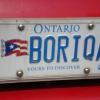
in-laws = boparenco = gebopatroj?
ca, kivuye
Ubutumwa 4
ururimi: English
BoriQa (Kwerekana umwidondoro) 28 Rusama 2013 12:04:31
I would have imagined that "in-laws" was "gebopatroj", which makes more sense to me.
gepatroj = parents
gebopatroj = in-laws
Can someone explain "boparenco" for me?
Is "gebopatroj" a valid synonym for "boparenco"?
Should it not be "boparencoj" since "in-laws" is plural?
Bruso (Kwerekana umwidondoro) 28 Rusama 2013 12:08:50
johmue (Kwerekana umwidondoro) 28 Rusama 2013 13:46:24
BoriQa:The translation for "in-laws" that I found in ESPDIC is "boparenco".I would say "bogepatroj"
I would have imagined that "in-laws" was "gebopatroj", which makes more sense to me.
gepatroj = parents
gebopatroj = in-laws
Can someone explain "boparenco" for me?"parencoj" (relatives) is more general than "gepatroj" (parents).
Is "gebopatroj" a valid synonym for "boparenco"?No "bogepatroj" is "parents-in-law". "boparencoj" can be any relatives-in-law, like uncle-in-law, brother-in-law, etc.
Should it not be "boparencoj" since "in-laws" is plural?If you are talking about one person which has some in-law-relation to some other person it can make sense to use boparenco in singular.
The judge in the courtroom might ask a whitness: "Ĉu vi estas parenco aŭ boparenco de la akuzito?"
Bruso:Actually I was wondering the other day if there was anything wrong with "booj".You need some indication that you are talking about persons. Indeed "bouloj" could make sense.
BoriQa (Kwerekana umwidondoro) 28 Rusama 2013 17:25:36
johmue:You need some indication that you are talking about persons. Indeed "bouloj" could make sense.I was refering to parents in law.
So the right term that I was looking for is then: bogepatroj
BTW, bogepatroj is indeed in ESPDIC. I was looking for the gebopratroj version, which I guess threw me off.
Thanks for the response!
Dankon!

